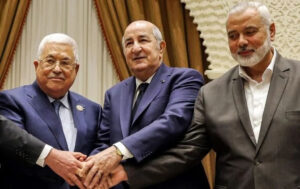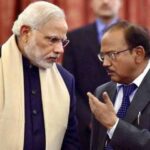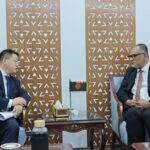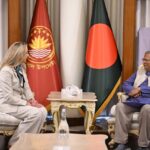 Palestinian President Mahmoud Abbas, left, Algerian President Abdelmajid Tebboune, center, and Hamas leader Ismail Haniyeh, Algiers, Algeria, July 5, 2022. (AFP)
Palestinian President Mahmoud Abbas, left, Algerian President Abdelmajid Tebboune, center, and Hamas leader Ismail Haniyeh, Algiers, Algeria, July 5, 2022. (AFP)
Moon Desk: Fourteen Palestinian factions, led by Fatah and Hamas, have received an invitation from Algeria to start a dialogue next week for Palestinian reconciliation, but doubts have overshadowed the gathering as few expect a significant breakthrough.
Various Palestinian forces announced that they had received Algerian invitations to participate in the two-day dialogue on Oct. 11-12.
Palestinian Prime Minister Muhammad Shtayyeh said at a Cabinet meeting on Monday that “the government will be ready for any step that supports reconciliation efforts and ends the division.”
Saleh Al-Arouri, deputy head of the political bureau of Hamas, said that the group has a principle that it does not miss any opportunity to achieve reconciliation and end the division, indicating that it informed Algeria of its readiness and seriousness to participate in the meetings.
Algeria has held separate dialogues with officials from Fatah and Hamas over the past few days to discuss the outlines of a paper prepared by an Algerian team for Palestinian reconciliation.
Last January, Algerian President Abdelmadjid Tebboune launched an initiative to unite the Palestinians and end the split between Fatah and Hamas, commissioned by the Arab League, provided that a final solution is reached before the Arab summit in November.
The Algerian team, which briefed the leaders of the two movements on the reconciliation paper, which will be presented during the next expanded meeting, asked them to avoid escalation during the current period, and to stay away from bickering, especially in the media, as this could thwart efforts to heal the rift.
The Palestinian factions have engaged in various dialogues to reach reconciliation during the many years since Hamas took control of the Gaza Strip in mid-2007.
The two movements concluded more than one agreement, the most prominent of which was in Makkah under the auspices of Saudi Arabia, as well as the Cairo Agreement brokered by Egypt.
Algeria is considered one of the Palestinian government’s most financially supportive Arab countries.Despite the positive public statements from the Palestinian factions toward the Algeria dialogue, ordinary Palestinians have cast doubt on its relevance.
Mahmoud Al-Rabi, 45, said: “Hamas and Fatah do not look at the Palestinian people or their need for reconciliation. They only want to achieve their own interests. What is different about this dialogue from previous ones? Nothing.”
Al-Rubai, who works as a history teacher in Gaza, added: “Will Algeria have the ability to achieve Palestinian reconciliation, as it is far from the Palestinian issue, in light of the two sides’ unwillingness to achieve reconciliation?”
Taghreed Toman, 29, said there was nothing new about the Algerian dialogue.
“This dialogue will be recorded in the files within the long list of dialogues that the Palestinians have engaged in to achieve reconciliation, and it will not have any impact on the ground, whether in Gaza or the West Bank,” Toman said.
Hamas and Fatah had agreed to hold the general elections for the Legislative Council, the presidency, and the National Council of PLO in succession, starting in May 2021, before the Palestinian President announced that they were canceled because Israel did not allow them to be held in the city of Jerusalem.
Palestine’s Ambassador to Algeria Fayez Abu Aita said that President Tebboune asked the two factions to develop a clear and practical vision for implementing and handing over reconciliation and working to find a solution to implement it.
Hamas proposed making fundamental amendments to the Palestinian political system, based on the principle of participation, adopting a unified political program for all Palestinians that recognizes all types of resistance, building Palestinian institutions on national foundations away from partisanship, and timetables for ending the division and the elections.
The Fatah proposal summarizes the formation of a national consensus government that accepts the Palestine Liberation Organization’s political program and meets international acceptance.
Hani Al-Masri, a Palestinian political analyst based in Ramallah, does not expect Algeria to succeed in achieving Palestinian reconciliation.
Asked if the Algeria dialogue has a chance of success, he said: “No, for a very simple reason, which is that the obstacles that prevented the success of previous dialogues and agreements still exist and have even become more rooted.”






